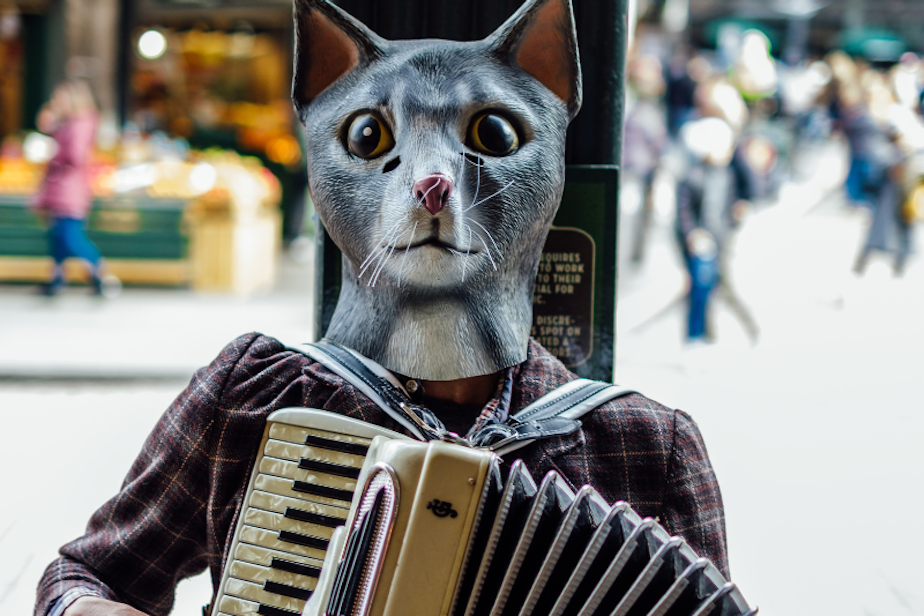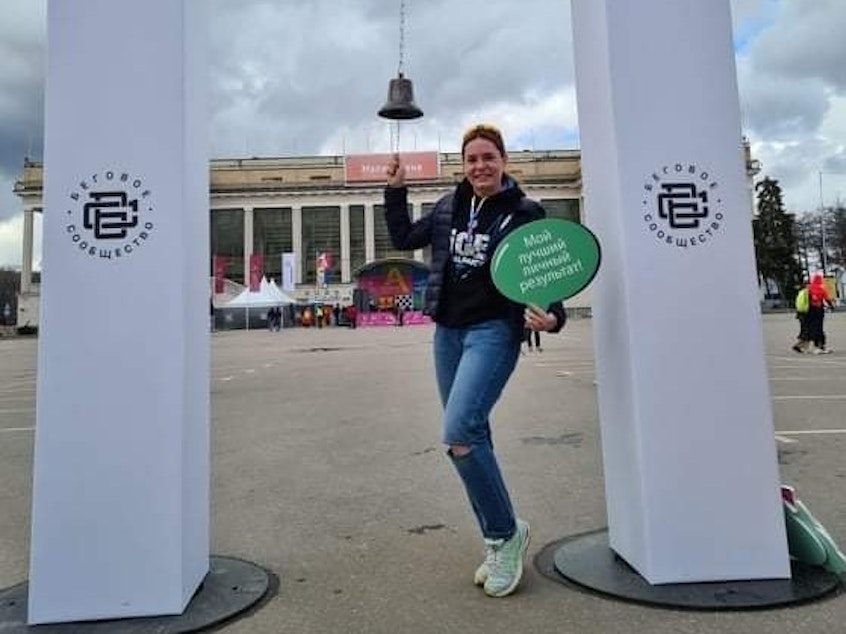Is Seattle still 'weird'? Today So Far

Is the Northwest weird? Is Seattle weird? Should we even be using the word "weird" so much?
This post originally appeared in KUOW's Today So Far newsletter for May 31, 2023.
There has been a notion that our region is "weird." For example, in the 1996 documentary "Hype!" about the explosion of Seattle music into the mainstream, one person credits the unique sound to the weirdness that was so potent throughout the Northwest. This regional weird was promoted in pop culture, such as "Twin Peaks" or even "Northern Exposure." Growing up around here, embracing this weird was a form of pride.
As we've all found out over the past few weeks, KUOW's Bill Radke has an obsession with words. He's pushed back against the overuse of "legendary" or "dive bar," for example. This week, Radke explains his disdain for "weird." He has even banned the word in his own home.
"I tell my kids to avoid the word 'weird' because I tell them that it doesn't describe whatever it is we are talking about, it just says they are having a reaction, and we are better off naming our reactions, and exploring our reactions ... So I move that nothing is weird, we banish the word," Radke explained on the most recent "Words in Review."
Erik Davis is author of "High Weirdness," which is about drugs. In a way, he specializes in weird, and overall, embraces it. "I think every place gets its own weirdness," Davis said.
"I write about California weirdness probably because I'm a Californian ... there's a certain inflection up there (in the Northwest). The woods are darker and gloomier, and there is perhaps more of a funky, magical mushroom energy permeating in the Pacific Northwest."
Sponsored
"[Weird] is kind of a wastebasket word," he adds. "We put things that we don't really know what else to say about. While that sometimes is a meaningless dodge, or a way of not articulating our feelings to ourselves, or not describing exactly what might be peculiar or unusual about the thing we are talking about, the fact we are relying on 'weird' also tells us something about weirdness in our lives and what we do with things that don't really fit."
Davis notes that if you pull out everything we put in that weird wastebasket, they might not relate. An uncomfortable interaction could be weird, so can a bizarre movie, or a spooky dream, or an unusual flavor. Weird is a category unto itself, with a diverse range of meanings, he argues.
"It lets us see something about reality that no other word really does," Davis said. "It's one of those words where you have to unpack it a little bit, but 'things that don't quite fit' is probably the best way to put it simply."
I've always felt that humans evolved to seek out patterns, normalcy. It's a way to survive. That "weird" sound in the bushes could be a giant animal coming to eat you, so knowing patterns (normalcy) and also things that stand out, have been important to us over our evolution. To me, weird is something that doesn't fit into a pattern. It can eventually become "normal" and fit in. And not fitting a pattern doesn't make something bad, it's just something that stands out. When Seattle music started making an impression in the 1980s and 1990s, it didn't fit the pattern the music industry had established, so it stood out. That was a good weird.
I would argue that Seattle is not weird. It once was, but that weird character has faded over the years. We still have the gum wall, and Archie McPhee (thank goodness!), but Seattle is more of the same these days — same buildings, same problems, same bumper stickers, same Teslas if you live in Ravenna. And what was once deemed weird is now just wearing socks with sandals as if that's just normal.
Sponsored
Radke still argues that nothing is weird. Yet after chatting with Davis, he has to admit that, in a way, everything is also weird. Their conversation goes into a lot of corners, like the emergence of AI. Check it out here.
Portland has long championed the maxim "Keep Portland Weird." I also have a T-shirt that proudly states, "Keep Spokane Kind Of Gross." These days, I find that our region's weird culture is more often found in little-known corners where people are free to be creative, try, fail, succeed, or simply just live without any finger pointing. What do you think? Is Seattle weird? Was it once weird? Is our region weird? And importantly, where is the weird found in our region today? Or do you agree with Radke and are ready to join a "ban the word 'weird'" campaign? Let me know at dyer@kuow.org.
AS SEEN ON KUOW

"Stranger Things: The Experience" is an interactive event for fans of Netflix's hit show. It just arrived in Seattle. It's part immersive theater, part 1980s throwback, part photo op, and all fun. Check out KUOW's review of the experience here, including a video tour. (Dyer Oxley / KUOW)
Sponsored
DID YOU KNOW?: The origins of pinball
In honor of the Northwest Pinball and Arcade Show coming up this weekend in Tacoma (it's a big deal to a lot of folks), here's a little pinball history.
The origins of pinball could be credited to the French who came up with a game called "bagatelle" in the 1600s/1700s (which itself was an evolution of billiards tables and croquette, etc.). This tabletop game involved hitting a ball onto a table with a stick. The table had pins spread throughout as obstacles. The goal was to get a ball past any obstacles and into a hole. The French brought bagatelle to North America, where it became quite popular in the 1700s/1800s (there's an old cartoon of Abraham Lincoln playing the game). It then went through some evolutions, such as making it smaller and portable, and building a spring-loaded plunger to launch the ball. The ball would be shot up onto the table, hit pin after pin, and hopefully land in a hole. The element of chance was a big part of this version of bagatelle, which placed it in the realm of gambling.
In the 1920s, bagatelle showed up in Japan, where it became quite popular and transformed into another game called "pachinko." In the USA, it wasn't until the 1930s that these games started to resemble the pinball machines we know today. Coin-operated machines were introduced. Electricity propelled its evolution at lightning speed, with bumpers, lights, and bells. The main thing that distinguishes modern pinball didn't come around until 1947 — the flippers. Different games started using flippers at various locations on the board. In the 1950s, they were placed toward the bottom where they have stayed ever since, as the machines continued to advance with electronics and computers.
The flippers removed much of the chance aspect of the game, without removing too much unexpected chaos. Whereas bagatelle boards would shoot a ball up, only for it to fall within seconds, modern players can now keep a ball in play for extended periods of time, while going on missions, completing tasks, and more. But due to pinball's roots in games of chance, the game was heavily associated with gambling, which put it in the crosshairs of anti-gambling politicians. Pinball was actually illegal in major parts of the USA for many decades, including in Seattle. That's a factoid for another day.
Sponsored
ALSO ON OUR MINDS

She had a dream job. Now, she's part of a massive brain drain hammering Russia
Though numbers are hard to come by, there is a reported wave of young Russians who have fled their country since its invasion of Ukraine. According to one estimate, more than 1.3 million Russians under the age 35 left the Russian workforce just last year alone. Especially among those who have fled the country are educated workers with in-demand skills like engineering or computer programming. This massive loss of talent looks to be one of the biggest economic consequences of Russia's invasion of Ukraine.

